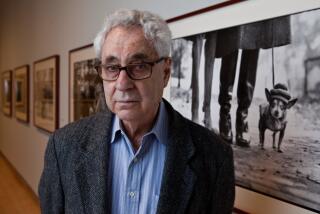Obituaries - Feb. 23, 1999
- Share via
Andreas Feininger; Photographer for Life Magazine
Andreas Feininger, 92, an innovative photographer known for his richly detailed images of New York City featured in Life magazine in the 1940s. The son of the Bauhaus painter Lyonel Feininger, he was born in Paris and raised in Germany. He moved in 1939 to the United States, where he worked as a freelance photographer with the Black Star Picture Agency. His clients soon included Life, and he joined its staff in 1943. From then until he left in 1962, he completed 346 assignments. Using experimental techniques and equipment that he devised and perfected, Feininger photographed the streets and sidewalks of mid-Manhattan caught in rush-hour gridlock, capturing the vibrancy of the city. The author of more than 30 books, Feininger privately took photographs focusing on the form of neutral objects, such as feathers, bones and shells. On Thursday at New York University Medical Center.
Hideo Itokawa; Leader in Japan’s Rocket Development
Hideo Itokawa, 86, a prominent aeronautical engineer and leader in Japan’s rocket development program. A native of Tokyo, Itokawa was widely known in Japan as “Dr. Rocket” for his instrumental role in the early stages of Japan’s space program. He succeeded in horizontally launching a 9.2-inch pencil rocket in 1955. Trained at what is now the University of Tokyo, Itokawa worked for Nakajima Aircraft Industries Ltd., where he helped design fighter planes for Japan’s military during World War II. In the mid-1960s he worked for the University of Tokyo’s Institute of Industrial Science developing high-speed projectiles and rockets. In 1967, after leaving the university over alleged misappropriation of research money, he set up the Systems Research Institute, a private think tank seeking better collaboration among people, technology and organizations. On Sunday in Maruko, Japan, of a stroke.
Rev. Walter Lini; Father of Independence for Vanuatu
The Rev. Walter Lini, 57, father of independence for the Pacific Island nation of Vanuatu. Formerly known as the New Hebrides, the nation consists of about 80 islands with 170,000 residents about 1,200 miles northeast of Australia. An Anglican priest, Lini became Vanuatu’s first prime minister in 1980, when 74 years of joint colonial rule by Britain and France came to an end. He held the office for 11 years and continued to serve in Cabinet positions after current Prime Minister Donald Kalpokas ousted him in 1991. When independence was declared on July 30, 1980, Lini was head of the Vanua’aku Pati and Kalpokas was his deputy. At the time of his death, Lini was leader of the opposing National United Party. On Sunday in Port Vila, Vanuatu, after a long illness.
Geoffrey Moore; Introduced American Studies in Britain
Geoffrey Moore, 78, a writer and academic who was instrumental in pioneering American studies as a discipline in British universities. Born in south London, Moore attended Cambridge University and in the late 1940s accepted an invitation to teach English literature at the University of Wisconsin. It was there that he became captivated with American culture. He moved on to Tulane University in New Orleans for four years and met writers, including a young Gore Vidal. On returning to Britain in 1952, Moore worked at the BBC, wrote for the Times Literary Supplement and edited the first of his influential anthologies of American writing. He founded the American studies department at the University of Hull, which is the oldest program of its type in Britain. On Feb. 5 in London.
More to Read
The biggest entertainment stories
Get our big stories about Hollywood, film, television, music, arts, culture and more right in your inbox as soon as they publish.
You may occasionally receive promotional content from the Los Angeles Times.










